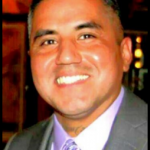Profiles in Recovery

J. Carlos Rivera
Rivera brings hope to Native Americans with his life-changing personal journey.
Growing up without a mother or father figure, Rivera became a ward of the court at age 13. He spent his teen years living on the streets or in group homes, treatment programs or juvenile detention centers. Through the process of intervention and recovery, Rivera found a sense of direction and the motivation to build a healthy foundation for his own family.
After earning a degree in chemical dependency studies, Rivera became a substance abuse counselor and was appointed by California Gov. Jerry Brown to the Juvenile Justice & Delinquency State Committee. He currently serves as Executive Director at White Bison, Inc., an international non-profit that provides culturally-based healing resources to Native America.
PreviousNextTribal Affiliation:
Enrolled member of the Sherwood Valley Band of Pomo Indians
Day Jobs:
Executive Director at White Bison, Inc.; Native American drummer/singer
What I lost to addiction:
I lost my career and also lost many relationships. To this day, people still remember me as the person I was when I was in using and have not forgiven me for my actions. They refuse to forgive me and see who I have become. I have accepted the things I cannot change.
At my worst, I was:
Homeless, unemployed, lost the trust of those around me, and was completely broke. I was also selling personal property to support my habit. I was lost and I didn’t have a sense of identity. I was suicidal and could not find my way out of my addictions. I truly felt LOST.
What worked for me:
For me, it was prayer first. Five months before I entered residential treatment I said a prayer and had asked, “if anyone is listening up there, if you have the power to give me one chance to change my life, I would commit to you and I would give my life over to helping others.”
On Nov. 1st, 2004 I entered a Native American specific 12-step inpatient program. It was a 90 day program and in this setting I practiced Native American spirituality and culture, through this I found my identity, which gave me strength to live life on life’s terms. Ultimately it gave me purpose, which was to be clean and sober. I knew that I wasn’t put on this earth to be an addict or alcoholic, especially being a father.
Advice to my younger self:
I would tell myself to spend more time with family and to cherish the moments with my grandmother. I would also tell myself to think before making decisions instead of being reactive.
Rules I live by:
Throughout my recovery process, I have learned the importance of being disciplined, loyal, and I consistently remind myself to think before making a decision. I also learned early on in recovery that it is important to have “winter funds,” which essentially means to always be working toward financial savings. This is important to me after experiencing homelessness in my addiction. Some things I never want to experience ever again.
On my bucket list:
Start my own Native American residential treatment program for men and women which would include culture, spirituality, twelve-step approach, ceremony and a transitional living program.
Favorite recovery quote:
”We move towards and become like that which we think about” ” ~ Don Coyhis, Mohican Nation, President and Founder of White Bison, Inc.
Best advice for newbies:
When recovery gets hard (because it will), stay close to your support network, we can’t do this alone. Also, remember to monitor your own expectations of yourself, don’t expect to deal with everything all at once. Be good to yourself and put one foot in front of the other.
Shed the Stigma:
If you’re a person in long-term recovery who wants to share your insights, please contact us at [email protected].